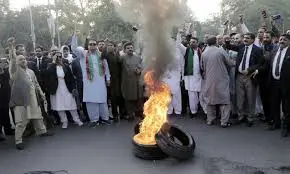Islamabad man to hang for wife’s murder over sons’ testimonies
5 min readISLAMABAD: A district and sessions court in Islamabad has awarded the death penalty to 38-year-old Nasir Hussain, a father of five, for the murder of his wife in Islamabad - almost two years to the day of the gruesome incident.
Judge Muhammad Atta Rabbani issued the 15-page order, which is available with Aaj Digital, taking into account the testimonies of Nasir’s two sons, aged 12 and 14.
The convict Nasir worked as a loader of goods on a Suzuki vehicle to transport them from one place to another. He has a history of addiction and substance abuse, according to the complaint and the court order.
He married Farzana around 18 years ago and the two had five children. Farzana worked as a maid and helper at various houses. According to the complainant, Farzana’s maternal uncle Nasir Khan, the convict regularly tortured his niece.
One of the domestic violence episodes ended in the death of Farzana.
During the trial, the prosecution produced 12 witnesses, including the two sons of the accused who were present when the incident took place. Others included the complainant Nasir, the chief medical officer at the hospital where the post-mortem took place and the relevant police personnel.
The two boys, 14 and 12 years old, and their cousin were sleeping in the same room of their rented house in the Islamabad suburb of Humak, according to the order. The couple’s other three children worked as domestic helpers in Islamabad and were not present at the house.
According to the two boys’ testimonies, they woke up at around midnight and heard their mother shouting and struggling. They saw their father cut her throat with a knife.
The testimony reveals that Nasir then loaded the body on the Suzuki along with the boys, and went to the Polyclinic Hospital.
It was at this point police got involved and the victim’s uncle was informed.
The Sihala police returned to the crime scene, where the boys identified the spot where the murder took place.
Police took the murder weapon (knife) into custody as well as the vehicle which was used for transporting the body to the hospital. They also took the blood-soaked carpet on which the murder took place.
Samples were sent to the Punjab Forensic Science Agency, including the blood-stained shalwar (trouser) of the accused.
According to PFSA response, human blood was identified on the said items. It did not specify whether it matched the blood type of the victim.
CMO Dr Shazia Nazeer, in her report and testimony, said that the probable time between injury and death was 20 minutes. The main wound was an incision 23 inches (almost two feet) in width on the neck with the trachea cut. The death resulted from “cession in blood supply to the brain due to cutting of carotid arteries and hypovolemic shock”. It added that the weapon used was sharp-edged.
The prosecution argued that the recovery of the murder weapon and other evidence to support the ocular account of the witnesses.
The lawyer for the defedant, Mirza Nazakat Baig, said that the case against his client was based on the evidence provided by two children and the items recovered by the police. He disputed the police claim that the children were present at the scene when the knife and blood-stained carpet was recovered. “The entire story is based on conjecture,” he said while calling for an acquittal.
The judge found the evidence to be sufficient while awarding the accused capital punishment. The convict has also been directed to pay Rs200,000 to the heirs.
The death sentence is contingent upon confirmation by the Islamabad High Court. The convict can appeal the sentence within seven days.
Death penalty in Pakistan
Earlier this month, Pakistan voted against a UN draft resolution calling for a moratorium on capital punishment. The resolution, which will be up for the UNGA’s endorsement next month, was amended to affirm “the sovereign right of all countries to develop their own legal systems, including determining appropriate legal penalties, in accordance with their international law obligations”.
The International Federation for Human Rights (FIDH) and the Human Rights Commission of Pakistan (HRCP) issued a summary on the sitaution on October 10, observed globally as the day against the death penalty.
Between Jan 2015 and August 2019, 2,454 people were sentenced to death. From August 2019 till August this year, the number dropped to 615.
It noted that Pakistan executed 508 death row prisoners from January 2015 to December 2019.
“From January 2020 to August 2022, no death row prisoner was executed.”
It cites the end of the jurisdiction of Pakistan’s eleven military courts after March 2019 and acquittals by the Supreme Court as possible reasons.
It adds that Pakistan remains among the countries with the largest number of individuals facing death sentences. “At the end of December 2021, 1,143 prisoners were on death row.”
Pakistan had placed a moratorium on capital punishment in 2008. It did not execute anyone from 2009 to 2011, with one instance in 2012 and none in 2013.
The moratorium was lifted in the wake of the terrorist attack on the Army Public School in Peshawar in 2014, in which 149 people, including 132 schoolchildren, lost their lives.
Pakistan carried out seven executions in 2014, 326 in 2015, 87 in 2016, 65 in 2017, and 14 in 2018.
Last year, the Supreme Court commuted two death sentences while ruling that capital punishment cannot be carried out to people with serious mental health issues.
In its landmark decision issued on 10 February 2021, the Supreme Court banned the application of capital punishment for people with serious mental health disorders.
The judgment read: “If a condemned prisoner, due to mental illness, is found to be unable to comprehend the rationale and reason behind his/her punishment, then carrying out the death sentence will not meet the ends of justice.”
Activists in Pakistan have long been polarised over the issue. There have been calls for public hanging of paedophiles and those involved in brutal murders - including the case of Zahir Jaffer. Those against the death penalty continue to protest it, calling it a violation of basic human principles.
For the latest news, follow us on Twitter @Aaj_Urdu. We are also on Facebook, Instagram and YouTube.
























Comments are closed on this story.